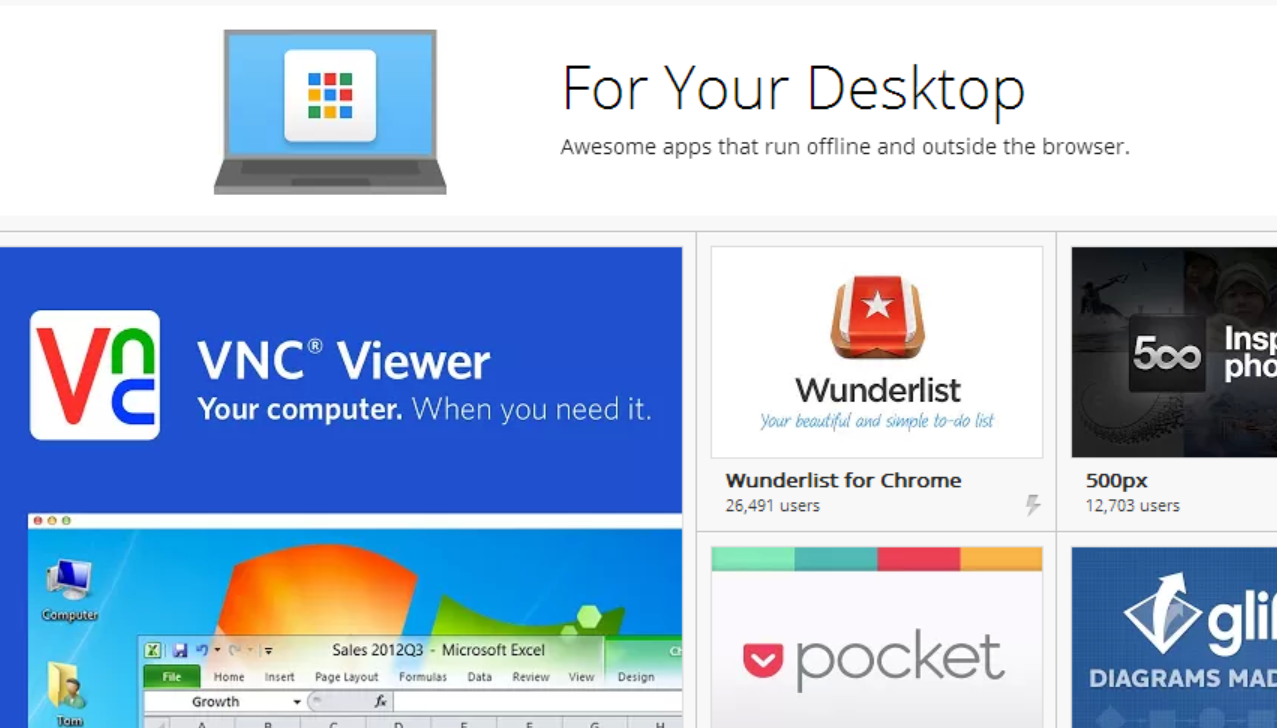
Google celebrates Chrome's 5th birthday with Apps for the desktop
Five years. That's how long it is since Chrome was unleashed on an unsuspecting world. Five years and we've already made it to version 29! There will undoubtedly be a few glasses charged in celebration, but Google is also taking this special date as an opportunity to reveal a "new breed of Chrome Apps". Head to the Chrome Web Store and you'll find a new section: For Your Desktop.
Working online with web apps has become increasingly common, but traditional desktop apps are still more popular. Now Google is looking to blur the boundaries between the two, making web apps much more like desktop software. The key thing to note here is that the apps that are found in this section do not -- after the initial download process of course - require an internet connection: they can be used in offline mode.

Google Chrome turns five -- Happy Birthday!
Kids and web browsers -- they grow up so fast these days. Seems like only yesterday that Google released its web browser to the public and set geek hearts aflutter with its speed and light footprint. Things have changed a bit, but many of us stick to the software as our browser of choice.
Google launched Chrome, in beta form, on September 2, 2008 for Windows only, and followed quickly with the source code as an open source project known as Chromium. The initial kickoff came in 43 different languages.
Google adds new 'reset to default' option to Chrome
If your current browser isn’t working as it should then you’ll appreciate the new "Reset browser settings" option (Settings > Advanced) Google has added to Chrome 29 FINAL. This restores the original default browser settings, while leaving apps, bookmarks and themes untouched.
As promised in the previous release, rich notifications (the system where alerts from apps and extensions can appear in a separate window, even when the browser isn’t running) is now available for Mac, as well as Windows. Check the Chrome 28 release post for settings guidance if this isn’t working for you.

10 things a Windows Phone 8 user misses about Android
Adopting Windows Phone 8, and ditching Android, was one of the most daring decisions that I have ever made in my entire tech life. I am the sort of person who does not warm up to major changes (not my strong suit), especially ones that involve transitioning between two polarizing mobile platforms. But, surprisingly, I gave up the flexibility and versatility of the green droid operating system for the glanceable information and simplicity of Windows Phone. Admittedly, it was not smooth sailing from day one.
The problem is that, in order to fully adjust to the change, something has got to give, namely features that I consider to be essential for a modern-day smartphone operating system. For some they may not matter as much, but others -- like me, and maybe you -- are likely to be left wanting for more. And, no, I am not talking about widgets, themes, root or Instagram (it, however, seems to be the tech media's favorite blaming toy even though there are good third-party alternatives), but rather more down-to-earth, mundane ones.
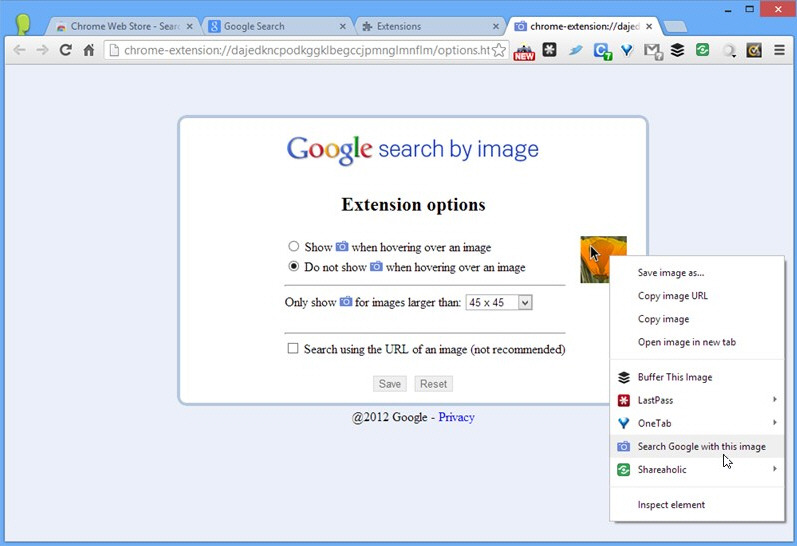
Find images quickly with Google Search by Image
And Google decreed, "Let there be image search, a tool whereby mortals may search for images by providing a source image". And it looked, and the tool was rather useful in its own way, but horribly awkward to use at times when you had to right-click the image, choose to copy its URL to the clipboard, switch to Google Image Search, paste the URL into the correct box and so on.
So Google said, "I can’t be faffing about like this", and its bods developed a browser extension to make the process much simpler. And so Google Search by Image for Chrome 1.5.0 and Google Search by Image for Firefox 1.1.2, were born.

Choose which Flash content to see with FlashControl for Chrome
While there are plenty of irritations to be found online, few are quite as annoying as Flash ads. Distracting animations, irritating music, applets expanding over content you’re trying to read -- it’s really no surprise that many people install ad blockers on a new PC before they do anything else.
Some ads will still penetrate your defenses, of course. And legitimate Flash content may occasionally be just as annoying as the worst adverts. To fully protect yourself, then, you’ll need a more general content filter, like the Chrome extension FlashControl.
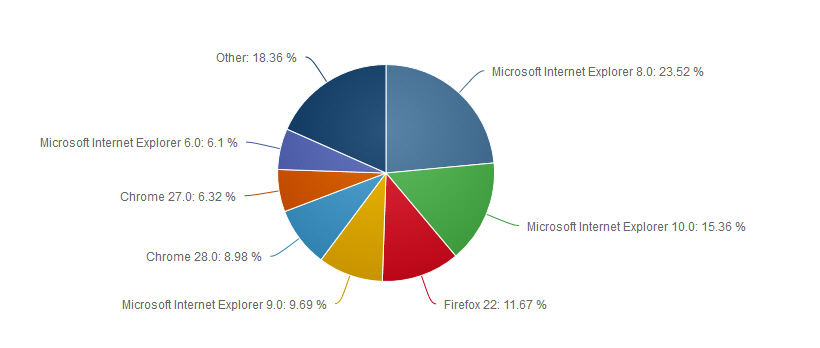
Internet Explorer remains three of the top five web browsers
Internet Explorer might no longer hold 96 percent of the browser market like it did back in 2002, but Microsoft’s browser still remains hugely popular. Firefox and Chrome took large bites out of IE’s dominance, but they have yet to topple it, and don’t look set to do so any time soon.
According to new figures from Net Applications, Internet Explorer 8 is the most popular browser on the desktop with 23.52 percent global market share. And it’s not the only incarnation of IE in the top five either.
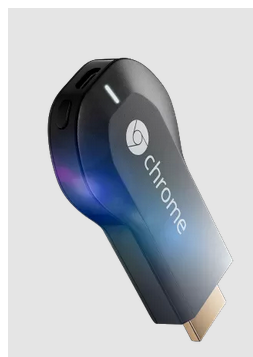
Google Chromecast already hacked
When I spent $35 on the new Chromecast, I expected that it would eventually be hacked. Truth be told, the possibility of tinkering with the device was a big factor in my purchase. However, I never expected it to be exploited so quickly. Today, GTVHacker announces that they have successfully hacked and rooted the media device.
According to the exploit authors, "...Google was kind enough to GPL the bootloader source code for the device. So we can identify the exact flaw that allows us to boot the unsigned kernel. By holding down the single button, while powering the device, the Chromecast boots into USB boot mode. USB boot mode looks for a signed image at 0×1000 on the USB drive. When found, the image is passed to the internal crypto hardware to be verified, but after this process the return code is never checked! Therefore, we can execute any code at will".
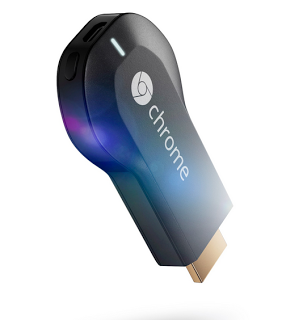
Google aims for TV everywhere, Netflix rides along
Google is dreaming big, but those fantasies are no larger than ones held by cord-cutters everywhere. We wish for TV without the cable or satellite and services like Hulu, Netflix, Amazon Prime and others aim to deliver the experience. Now Google tosses its own hat into the ring.
"Today, with the launch of Chromecast and the new Nexus 7 tablet, it’s even more effortless to enjoy content you care about—whether it’s video, music, movies, games—wherever you are, across your devices".
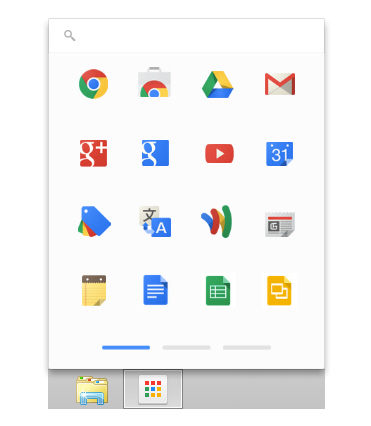
Google releases Chrome App Launcher for Microsoft Windows 7 and 8
I am a big fan of Google’s Chrome OS. However, even though I use my Chromebook all the time, I am the first to admit that it is really just a glorified web browser. Truth be told, the operating system’s web apps are nothing more than links to web pages. However, packaged apps which resemble native apps (such as the great IRC client CIRC) are slowly increasing in quantity and quality.
Today, Google officially releases Chrome App Launcher for Windows. The launcher was previously available for the beta and dev versions of Google Chrome but it is now available for the stable build too. The launcher mirrors the one found in Chrome OS. In installing it, Windows users gain some of the same functionality as Google’s browser-based OS.
Google Chrome for iOS offers app interoperability, full-screen support on iPad
Hot on the heels of its Google Maps for iOS update, Google has unveiled Google Chrome for iOS 28, its alternative web browser for iPad, iPhone and iPod touch users. The new build contains a number of notable new features, plus rolls out full-screen support for iPad users, something that has been available to iPhone users for quite some time.
The first major new feature is better interoperability with other Google apps. By tapping Settings > Google Apps in Chrome itself, users can instruct the browser to pipe relevant links through to other installed Google apps such as YouTube, Google Drive and Google Maps rather than using the browser itself.

Run Chrome extensions in Opera
The rebooting of Opera 15.0 saw the niche browser switch to a new rendering engine, adopting Chrome’s Blink in favor of its own proprietary Presto engine. In restarting the browser from scratch, Opera has opted not to include a lot of popular functionality from previous versions -- some of this is temporary, while others (specifically bookmarks) could be permanently lost.
One way of restoring some functionality is through extensions, small programs written in HTML, CSS or JavaScript. Opera has its own Extensions store, but the great news for early adopters of Opera 15 is that -- with the aptly titled Chrome Extension for Opera 2.0 installed -- you can use Google Chrome Extensions too.
Chrome 28 adds richer notifications, implements new Blink rendering engine
Google has released Google Chrome 28 for Windows, Mac and Linux. The latest version of its open-source, cross-platform web browser sees Google implement the latest revision of its web rendering engine -- Blink -- and also give apps and extensions a better platform for interacting with users outside of the main browser window.
As part of the switch to a "richer" notification system, Chrome introduces a new Notification Center, which works independently of the browser via the taskbar or menubar. Already present in Chrome OS, the center currently only appears on Windows builds with this stable release, but will be extended to Mac and Linux shortly.

Opera 15 is a fresh start, not the end
Opera Software made a bold move earlier this year when the company announced that it would use WebKit as its rendering engine and V8 as the JavaScript engine for all new products. Later on it revealed that it would follow Google and use the Blink Fork instead of WebKit, but that did not change the explosiveness of the move.
It took the Norwegian company five months to release the first final version of Opera for PCs that is powered by the new engines. While that seems like a long time for users who wanted to find out how the change would affect them personally, the development time is not that long.
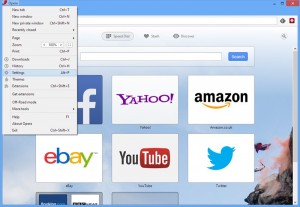
Stable Opera 15 arrives with new features and rendering engine
Just a month after unveiling the first beta to the public, Opera Software has released Opera 15.0 FINAL. The latest version of the browser receives a complete reboot, sporting a different rendering engine, revamped interface and a number of new features.
The new release does not spell the end of the previous version, however, with Opera 12.15 FINAL still available (and due to receive an update shortly) for those reluctant to move on.
